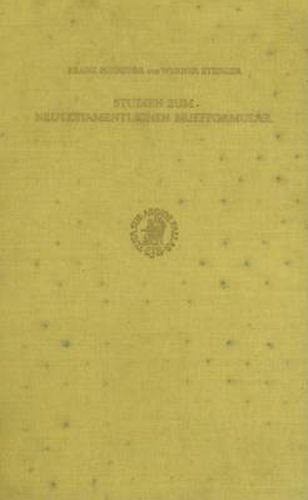Readings Newsletter
Become a Readings Member to make your shopping experience even easier.
Sign in or sign up for free!
You’re not far away from qualifying for FREE standard shipping within Australia
You’ve qualified for FREE standard shipping within Australia
The cart is loading…






Die Methodenreflexion der 70er Jahre hat das exegetische Instrumentarium durch Aufnahme literaturwissenschaftlicher Gesichtspunkte verfeinert. Es scheint darum geboten, die Ergebnisse der form- und gattungskritischen Erforschung der ntl. Briefliteratur, wie sie vor allem in der amerikanischen Exegese mittlerweile schon Tradition hat, mit einem gescharften Methodenbewusstsein zu uberprufen und durch eine erneute Analyse der brieflichen Rahmenteile weiterzutreiben. The improvement of methods, as this took place in the field of biblical research during the ‘70s, has refined exegetical instruments by adopting features of linguistics and literary criticism. Consequently, it seems appropriate to re-examine the results of genre-critical investigation of New Testament epistolary literature, as these have been reached through the efforts of American scholars in particular, in order to gain further understanding not only on details but also a more comprehensive total view of the epistolary framework.
$9.00 standard shipping within Australia
FREE standard shipping within Australia for orders over $100.00
Express & International shipping calculated at checkout
Die Methodenreflexion der 70er Jahre hat das exegetische Instrumentarium durch Aufnahme literaturwissenschaftlicher Gesichtspunkte verfeinert. Es scheint darum geboten, die Ergebnisse der form- und gattungskritischen Erforschung der ntl. Briefliteratur, wie sie vor allem in der amerikanischen Exegese mittlerweile schon Tradition hat, mit einem gescharften Methodenbewusstsein zu uberprufen und durch eine erneute Analyse der brieflichen Rahmenteile weiterzutreiben. The improvement of methods, as this took place in the field of biblical research during the ‘70s, has refined exegetical instruments by adopting features of linguistics and literary criticism. Consequently, it seems appropriate to re-examine the results of genre-critical investigation of New Testament epistolary literature, as these have been reached through the efforts of American scholars in particular, in order to gain further understanding not only on details but also a more comprehensive total view of the epistolary framework.